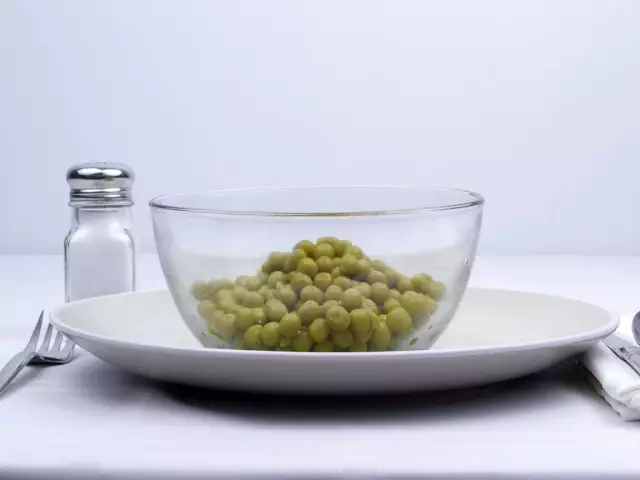- Author Rachel Wainwright wainwright@abchealthonline.com.
- Public 2023-12-15 07:39.
- Last modified 2025-11-02 20:14.
Fresh basil
Basil is a spicy aromatic plant that came to us from the east. It has more than 60 varieties, but most often we are talking about Ocimumbasilicum - a fragrant basil, which is known to us primarily as a seasoning in cooking. In addition, the plant has medicinal properties and is widely used in medicine, perfumery and cosmetology.
The ratio of BJU in the product

Source: depositphotos.com How to burn 23 kcal?
| Walking | 6 minutes |
| Jogging | 3 min. |
| Swimming | 2 minutes. |
| A bike | 3 min. |
| Aerobics | 5 minutes. |
| Household chores | 8 minutes |
The supposed homeland of the basilica is Africa and South Asia. In India, this plant is considered sacred along with the lotus. In Egypt, basil was used in the mummification of pharaohs, and magical properties were also attributed to it. Basil was brought to Europe in the XII century, and at first it was mainly used as an ornamental and medicinal plant.
Basil was considered a talisman of family well-being, and having a pot of this plant at home was considered a must. It was only in the 18th century that it began to be used as a seasoning in cooking. So what is basil good for?
The healing properties of basil
- Protection of the body at the cellular level;
- Antibacterial;
- Anti-inflammatory;
- Source of vitamins and minerals;
- Diuretic;
- Antiemetic;
- Toning;
- Appetite stimulation.
Cellular protection:
Basil leaves contain a significant amount of essential oils, the composition of which is unique. Special substances - flavonoids - provide protection of body cells from radiation and external negative influences.
Antibacterial action:
The antibacterial effect of this plant is due to the presence of special components in the composition of essential oils (estragol, evengol, limonene, linalool), which are able to suppress the growth of microorganisms such as E. coli, Staphylococcus aureus, Pseudomonas aeruginosa. The use of basil as a seasoning, dry or fresh, is the prevention of intestinal infections.
Anti-inflammatory action:
The anti-inflammatory effect is due to the presence of a substance - eugenol, which blocks a specific enzyme involved in the inflammation reaction. The action of eugenol is similar to drugs such as aspirin, paracetamol. Therefore, basil is useful for people with existing chronic inflammatory processes - rheumatoid arthritis, chronic colitis, etc.
Source of vitamins and minerals:
Basil leaves contain many vitamins and minerals. Thus, basil is a source of vitamin B 2, C, P, K, the precursor of vitamin A (carotene). Magnesium, iron, potassium, calcium are also found in this medicinal plant. Such a rich composition contributes to a multifaceted effect on the human body - it strengthens the walls of blood vessels, improves blood flow to the heart muscle, reduces the risk of arrhythmias, helps to lower cholesterol, and improves hair and nail growth.
Other properties:
The use of basil is justified in kidney disease, as it has a mild diuretic effect. Also, some components of essential oils help to cope with urolithiasis.
Basil has a beneficial effect on the gastrointestinal tract, improves appetite, has antiemetic properties, reduces flatulence (gas formation), and helps with digestive disorders.
The use of basil in medicine
The use of basil in medicine is truly multifaceted. Since basil has antibacterial and anti-inflammatory effects, its decoction is widely used in the treatment of diseases of the oral cavity and respiratory tract. Rinsing the mountain with a decoction of basil is useful for acute respiratory infections, tonsillitis, stomatitis. It is also helpful for chronic smokers to take this broth. Basil inhalation is beneficial for bronchitis.

How is basil beneficial for the digestive system? It not only stimulates appetite and the production of digestive juices, but also helps to cope with nausea. For the treatment of diseases of the gastrointestinal tract, basil decoctions are used, and basil oil can also be added to the water.
Pregnant women can be advised of basil oil for nausea with toxicosis in the first half of pregnancy, but it should be borne in mind that basil is contraindicated with an increased tone of the uterus.
A decoction of basil will help women to stimulate lactation, restore the menstrual cycle.
Basil tea is good for relieving stress, stimulating appetite, and treating depression.
Basil essential oil can be added to the bath to treat skin conditions, as well as to stimulate the immune system and relieve headaches.
YouTube video related to the article:
Found a mistake in the text? Select it and press Ctrl + Enter.






